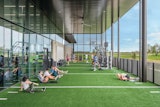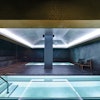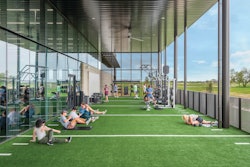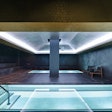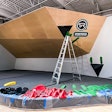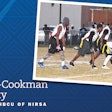![[Photos courtesy of Stonestown Family YMCA]](https://img.athleticbusiness.com/files/base/abmedia/all/image/2019/09/ab.StartingLines919_feat.png?auto=format%2Ccompress&q=70&w=400)
Professionals in the athletics, fitness and recreation industries dedicate themselves to building programs that will bring out their clientele's full potential. These programs often take place inside beautifully designed facilities with plenty of amenities — but what if the building itself could help contribute to the goal of improving overall wellness?
A recently developed standard seeks to recognize buildings that do just that, and the Stonestown Family YMCA in San Francisco was the first fitness facility in the world to be recognized for meeting it, thanks to a $4.1 million capital improvement project.
The WELL Building Standard "harnesses the built environment as a vehicle to support human health, wellbeing and comfort," according to the International WELL Building Institute. Based on evidence-based best practices, the standard aims to help the built environment improve the wellness of everyone who occupies it, whether they work there or are just there to work out.
"The Y has always provided safe spaces for our community to be healthy. It makes sense that we should consider how our buildings contribute to healthy living," says Chuck Collins, president and CEO of YMCA of San Francisco. "We are proud to be the first fitness facility in the world to have achieved such a high standard in service to our members."
Much like LEED, which encompasses a variety of categories ranging from building design and construction to operations and maintenance, the WELL standard is composed of seven different wellness categories: air, water, nourishment, light, fitness, comfort and mind. Each category has its own impact on overall wellbeing — and the WELL standard aims to incentivize builders to create spaces with these elements in mind.
"It overlaps with LEED a little bit, but it's more comprehensive and it's more focused on health and human experience," says Josh Leonard, senior executive director at the Stonestown Family YMCA.
The partnership between the facility and WELL began in part because WELL was looking to develop a standard specifically for fitness facilities to go along with the standards that were already developed for building categories such as office, retail, multifamily residential, education, restaurant and commercial. "They wanted to see if we could be a pilot for that process and give them a little bit of feedback on what they were thinking for the fitness standard," Leonard says.
The result is a facility that focuses intently on the details. Everything from the low-VOC paints, to the air filtration incorporated within the HVAC system, to the acoustics of a given space helped the facility to meet the standard. In the upstairs cardio area, special attention was paid to things such as lighting, sound and vibration, and even the types of equipment within the space. Lights of a certain temperature were chosen with the intent of not disrupting a user's circadian rhythm. Materials and systems were used that would provide a nondisruptive soundscape. And finally, a variety of equipment was made available in the appropriate quantities and accompanied by instructions for safe use. "That part of the standard was fairly easy for us to meet," Leonard says.
Once the details were decided, the facility underwent a thorough performance verification to ensure that it did indeed meet the standards.
"When we did the performance verification, I was in there at 11 o'clock at night after our facility is closed with a person testing it, and she's got balloons all over the room, and she's got the sound monitor, and she's popping balloons, and she's registering how much vibration there is," says Leonard. "And then when the HVAC is on and nothing is happening, she's also testing the ambient sound level — is it quiet enough when the HVAC is on?"
Though designers went to great lengths to ensure that the facility provides users with an excellent experience, Leonard hopes the users simply enjoy it.
"I encourage them to know as much as they'd like to know about it, but my hope is that it's sort of a subconscious thing," he says. "People may not notice that our water filters meet a much higher standard, but hopefully that sort of thing goes into the overall experience of 'this is a place for me to reach my full potential.' "
According to Leonard, becoming the first fitness facility certified under the standard is "a feather in the cap" of the Y, which tends to trail for-profit facilities in terms of being on the cutting edge of such innovation. "There are additional costs that went into achieving this standard, from construction costs to consulting costs," he says. "I'm just proud that as an organization, a nonprofit like the Y can be on the leading edge of this kind of process, where we're creating buildings that are actually from top to bottom built around the same core values and mission that we have as an organization."
Stonestown Family YMCA features that helped the facility achieve WELL Certified Silver:Air — New-air filtration, pollution-source reduction, proper ventilation, low-chemical material selection and cleaning standards, with frequent wipe-down schedules to minimize the spread of germs and ensure high air quality Water — New water bottle filling stations with water tested for inorganic contaminants, organic contaminants and agricultural contaminants, as well as public water additives that can be harmful in large quantities to help members and staff stay hydrated Nourishment — Policies for offering healthier food choices, such as fruits and vegetables and foods without harmful trans fats or high levels of sugar per serving, and nutritional information available to help visitors and staff identify potential artificial ingredients Light — Maximized natural light, staff workstations designed to reduce glare, and artificial light that supports natural patterns of the human circadian rhythm, an internal clock that synchronizes daily physiological functions Fitness — Optimized fitness program schedules to support active daily routines for members and staff Comfort — Design that prioritizes physical comfort through ergonomics, temperature, minimized noise and smell to optimize productivity and satisfaction within the environment for members and staff Mind — Access to programs designed to improve mental state and increase mindfulness, and new environmental design elements including colors and wall art that help reduce stress and support cognitive and emotional health for members and staff |
This article originally appeared in the September 2019 issue of Athletic Business with the title "YMCA becomes first fitness facility to achieve WELL Building Standard." Athletic Business is a free magazine for professionals in the athletic, fitness and recreation industry. Click here to subscribe.










